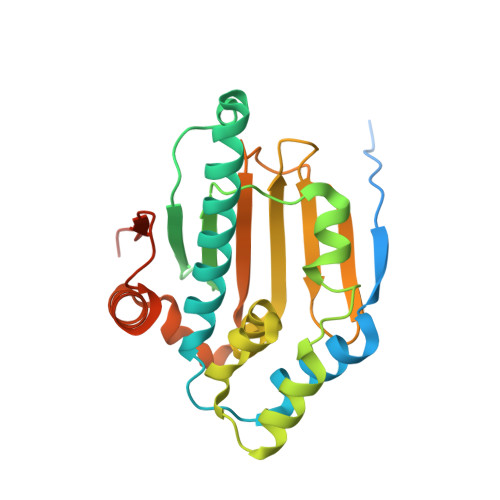Probing the role of Arg97 in Heat shock protein 90 N-terminal domain from the parasite Leishmania braziliensis through site-directed mutagenesis on the human counterpart.
Tassone, G., Mangani, S., Botta, M., Pozzi, C.(2018) Biochim Biophys Acta Proteins Proteom 1866: 1190-1198
- PubMed: 30248409
- DOI: https://doi.org/10.1016/j.bbapap.2018.09.005
- Primary Citation of Related Structures:
6GP4, 6GP8, 6GPF, 6GPH, 6GPO, 6GPP, 6GPR, 6GPT, 6GPW, 6GPY, 6GQ6, 6GQR, 6GQS, 6GQU, 6GR1, 6GR3, 6GR4, 6GR5 - PubMed Abstract:
In Brazil, the mucocutaneous form of leishmaniasis, caused by the parasite Leishmania braziliensis, is a widespread and very challenging disease responsible for disfiguration and, in the most severe cases, death. Heat shock protein 90 (Hsp90) is a ubiquitous molecular chaperone playing a pivotal role in the folding process of client proteins, and therefore its activity is fundamental for cell survival and proliferation. Since the chaperone activity requires ATP hydrolysis, molecules able to occupy the ATP binding pocket in the protein N-terminal domain (NTD) act as Hsp90 inhibitors. The development of selective molecules targeting the ATPase site of protozoan Hsp90 is tricky for the high homology with the human Hsp90 NTD (hNTD). Notably, only the human Lys112 is replaced by Arg97 in the L. braziliensis enzyme. Recently, this difference has been probed to design selective inhibitors targeting parasite Hsp90s. Here, a reliable protocol for expression and purification of LbHsp90-NTD (LbNTD) was developed but its structural characterization was unsuccessful. The role of Arg97 in LbNTD was hence probed by means of the "leishmanized" K112R variant of hNTDŽ┴. To deeply investigate the role of this residue, also the hNTDŽ┴ K112A variant was generated. Structural studies performed on hNTDŽ┴ and its variants using various ADP and ATP analogues and cAMP revealed that this residue is not crucial for nucleotide binding. This finding strongly suggests that Arg97 in LbNTD and more generally the conserved arginine residue in parasite Hsp90s are not exploitable for the development of selective inhibitors.
Organizational Affiliation:
Department of Biotechnology, Chemistry and Pharmacy, Department of Excellence 2018-2022, University of Siena, via Aldo Moro, 2, 53100 Siena (SI), Italy.


















